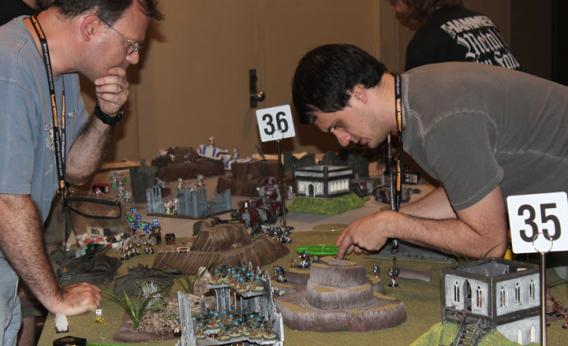Courtesy of Army Sgt. Steffan McBee.
As an Army officer, Maj. Stephen D. Carey has served tours of duty in Iraq and Afghanistan. In his spare time, he fights a different kind of battle, one that rages in the apocalyptic 41st millennium. The distant future would be a terrifying realm for a mere mortal, what with all the Necrons, Tyranids, and Tau on the loose. To survive the war-torn galaxy, Carey enlists the help of marauding, green-skinned Orks. He also presides over an Imperial Guard army, because some days, defending mankind is more fun than trying to destroy it.
This is the intricate, intense world of Warhammer 40,000, a tabletop war game played with hand-painted, miniature figurines. Warhammer 40,000, which its devotees call 40K, first hit shelves in 1987 and is the product of Games Workshop, a British corporation whose influence extends far beyond the United Kingdom. Around 70 percent of the company?s sales come from abroad, and the retailer has 86 official stores in North America alone.
What kind of people stage make-believe wars with armloads of Space Marines? A lot of the time, it?s real Marines. Games Workshop?s U.S.-based outreach manager estimates that 20 to 25 percent of Games Workshop?s American customers are active members of the military. If you include veterans, she says, that number jumps to about 40 percent. ?The bottom line is, there are nerds everywhere,? Carey explains. ?I?ve been an infantryman for 20 years. I?m no stranger to fighting. But I?m a total nerd.?
 Chaos Space Marines Terminator Lord from Warhammer 40,000.
Chaos Space Marines Terminator Lord from Warhammer 40,000.Courtesy of Games Workshop.
Warhammer 40,000?s geeky shell hides a militaristic soul. I spent a recent afternoon watching 40K at the Northern Virginia home of Mike Brandt, an attorney who runs one of the country?s biggest annual Warhammer conventions, the NOVA Open. The atmosphere at Brandt?s place was like an Ork-themed poker night?guys smoked cigars, drank beer, and instead of talking trash, gossiped about 40K?s new edition. The fast-paced, one-on-one matchups were contested on 6-by-4-foot pieces of wood. Each player served as his own general, controlling model soldiers, tanks, and futuristic aircraft with dice rolls. (Since there are no defined spaces, tape measures?like this skull-shaped one?were used to determine how far pieces moved.)
The game is essentially Risk but with Dark Eldar and Chaos Daemons. ?It?s like playing chess with toy soldiers and using a textbook for rules,? says former Marine Samuel Corum, a combat photographer who served two tours of duty in Iraq.
Corum isn?t exaggerating. The 40K Rulebook is 452 pages long. Each set of characters has a 100-page manual that explains its back story, abilities, and point values. The 40K wiki describes the Orks as being ?dominated by the WAAAGH!, a gestalt psychic field they generate that affects the Ork psyche, which allows Orks to instinctively recognize who is ?bigga?, and therefore who is in charge, since might makes right in Ork society.?
In 40K, though, mythology is less important than victory. ?My whole goal is to kill you,? explains Charles Pope, a former Army sergeant. ?I don?t want prisoners.? And when you?re playing with another service member, that kill-or-be-killed attitude is A-OK. ?It?s a lot more fun to play games with servicemen because they have an ingrained sense of rules; they don?t complain about them,? says Neil Gilstrap, who co-hosts the 40K-centric podcast The 11th Company. They also enjoy flexing their strategic muscles. ?How the mechanics of the game work, how to put together the best army, what units function the best,? Carey says, ticking off military skills that translate to 40K. ?[The game] satisfies the inner tactician in a lot of soldiers.?
 A Warhammer 40K game at the NOVA Open.
A Warhammer 40K game at the NOVA Open.Courtesy of NOVA Open, LLC.
40K may not be a true simulation of armed conflict, but it?s part of a centuries-long tradition of war games. After World War II, U.S. Navy Adm. Chester W. Nimitz credited gaming for helping the Allies prepare. ?The war with Japan had been re-enacted in the game rooms here by so many people and in so many different ways,? he said, ?that nothing that happened during the war was a surprise?absolutely nothing except the kamikaze tactics towards the end of the war; we had not visualized those.?
Source: http://feeds.slate.com/click.phdo?i=59fb87d94b8e4dc03e6ece3ab4d7cc98
mario williams vcu unlv sam young ncaa bracket ramon sessions portland trail blazers
No comments:
Post a Comment